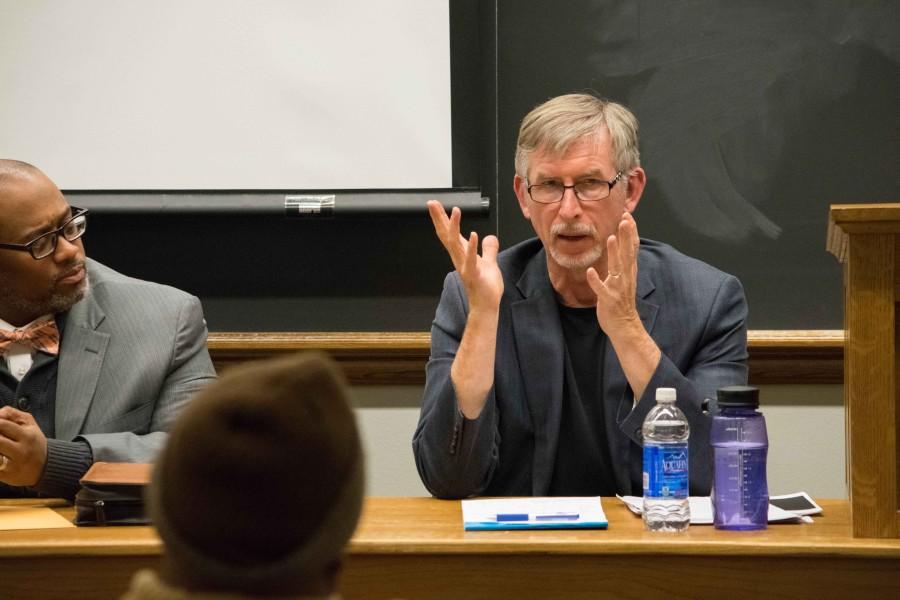Panel talks criminal justice
Criminology professor, Keith Crew, speaking at the non-partisan criminal justice panel hosted by Students for Rand at Seerely Hall on Wednesday
Jan 25, 2016
On Wednesday Jan.20, close to 30 people attended a non-partisan criminal justice reform panel at Seerley Hall. The panel was hosted by UNI’s Students for Rand organization.
Criminal justice reform is a central issue for Rand Paul’s campaign. According to the Students for Rand Facebook page, “non-violent ‘criminals’ keep our prisons full, police violence is a hot-button topic around the nation and the torch of individual liberty is being smoldered by a broken justice system.”
The panel of experts included two students, an ex-felon and a criminology professor.
Discussion at the event focused on kinks in the U.S. criminal system and the injustices that felons face, as well as opinions on how to fix these problems.
The event kicked off with a video of one of the panel members, Trent Keller, and the experience he had with Rand Paul when he visited Keller’s barber shop, the Hairport, on Dec. 5, 2015.
The video included a conversation between Paul and Keller, in which Keller told his story of getting arrested for drug possession as a young man and the unfortunate consequences he still faces years after the fact.
Paul told Keller in the video that he will do what he can to eliminate these disparities, even if he doesn’t get elected as president.
Paul wrote to Governor Branstad and explained why Keller should have his rights restored in order to eliminate the negative stigma that can follow a felon for the rest of their lives–especially when they are a remarkable citizen, which according to Paul, Keller is.
Keller came up to the stand during the panel and spoke of his personal injustice. He spoke about how although he got in trouble once, he served his time, never got arrested again and became a community role model. Yet, he still had to deal with the loss of rights and disparities that being a former felon involves.
“Think before you act,” Keller said. “You might think the people you are hanging out with are the coolest guys around, but when it’s time to go to jail, you are all by yourself.”
Another panelist was criminology associate professor, Keith Crew. He spoke of ways the criminal justice system could improve, specifically stressing the need for officers to have a four-year college degree, a change in tactics and training and preparing officers for diversity challenges.
Crew also spoke of the stigma felons get stuck with after one arrest and how unfair that judgment can be.
“Some people who go to prison are really no different than you and me,” Crew said. “I even did things when I was younger that could have gotten me arrested.”
The other two panelists were graduate students in communication studies, Samuel Harris and Jarael Madyun. Harris made a point about how jail time is supposed to be your punishment and questioned why should felons continue to get punished after release.
“Voting rights are a simple American value, and it isn’t really fair to take that away,” Harris said of convicted felons losing their right to vote upon being locked up.
Madyun also expressed the importance of college students and community members being knowledgeable in the court and criminal justice systems.
“It’s the people not [at this panel] who need to hear about this,” Madyun said. “We need to create an outlet to reach more people and educate them.”
Although this panel focused on criminal justice, it was hosted by Students for Rand. The president of the organization, Johnathan Fossum, explained how this event related to Rand Paul’s campaign.
“Rand Paul is a different kind of candidate,” Fossum said. “And criminal justice is an issue that Rand talks about.”
Fossum also discussed the success that Students for Rand has had thus far, and how he is very happy about the support they have received by students. Fossom said Paul is the only republican candidate represented at UNI, so he finds it important to spread the word through programs like this.
Several students came to the event to show their support as well. One of these students was junior criminology major, Drew Montz. Montz decided to come to the event because he was taking a class with Crew and thought it would be interesting since he is majoring in criminology.
“I liked how the speakers spoke about both sides–the community and the law enforcement,” Montz said.
However, Montz isn’t completely convinced that the problems discussed will get fixed anytime soon, even by the next president.
“There are a limited few who will actually take the steps needed to fix these problems,” Montz said.








